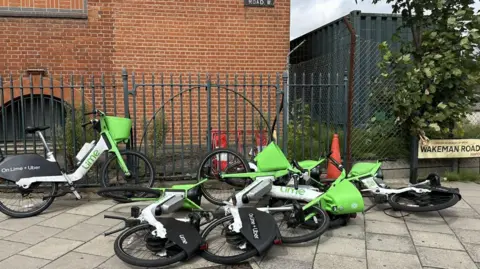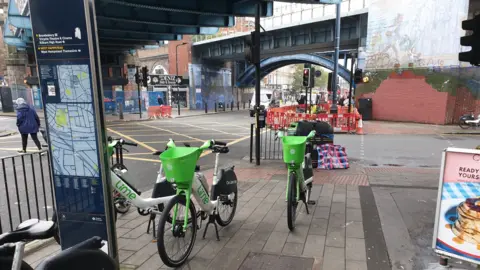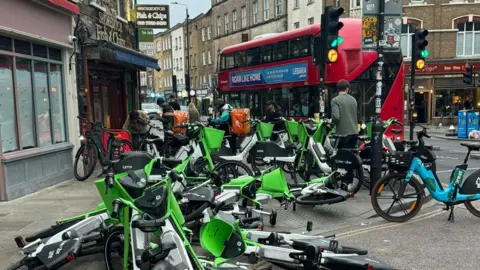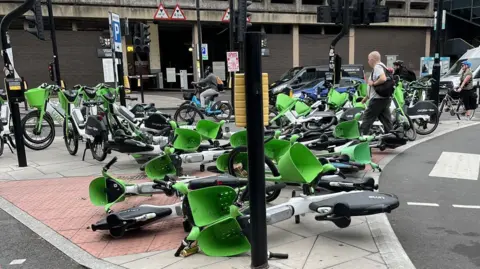
 Brent Council
Brent Council
Officials in Brent have threatened to ban Lime's dockless e-bikes as poor parking has obstructed pavements
The screeching of rubber skidding on tarmac pierces the air on a quiet morning in north-west London. A young man on a Lime bike has suddenly overtaken a car in the next lane to dodge a roadworks sign. The driver gives him an earful.
Minutes before, a mum with a pram was telling me that dangerously driven e-bikes were a big worry - and annoyance.
Laura was taking her toddler to a park near their home in Kilburn, where the local council has told Lime they will ban their rental e-bikes next month unless they agree to a set of demands.
The council wants riders to park in cordoned-off areas only and increased fines for those who don’t.
Lime says it is willing to work with Brent Council but wants more of these parking zones to ensure it is still a convenient service for its customers in the borough.
Laura used to live in Paris where another controversial vehicle - rental e-scooters - were banned last year. Officials in Madrid announced a similar move last week and Melbourne banned them last month.
In all three cities, bad parking, as well as dangerous driving, were cited as key reasons why they had to go.
As Melbourne’s mayor Nicholas Reece explained: ”People don’t park them properly. They’re tipped, they’re scattered around the city like confetti, like rubbish, creating tripping hazards.”
A walk around Kilburn illustrates his point.
Someone has left their Lime bike in the middle of the pavement, in the way of a road crossing with tactile paving that is used by visually impaired people. They feel for the raised bumps, with a cane or through their shoes, which help them cross safely.


Dockless e-bikes obstruct access to tactile paving on a road crossing in Kilburn which is used by visually impaired people
Ali, who uses a motorised wheelchair, says using stations is difficult enough because lifts are often out of order. Dodging e-bikes to reach them is just another problem he's forced to deal with.
There are similar stories in other parts of Brent. Outside Neasden station, tightly parked bikes narrow the pavement to the point only one person can walk along it.
Pedro, a car mechanic in Dollis Hill, complains angrily that riders regularly leave their e-bikes in front of his garage. Two weeks ago the pavement was completely blocked. “Something needs to be done,” he says. “There are so many of them.”
One of the reasons why London feels inundated with rental e-bikes is that, unlike e-scooters, their numbers are not controlled by Transport for London (TfL).
The e-scooters are part of a national trial overseen by the government and organised by local authorities, like TfL, in British towns and cities.
Transport officials think scooters can help reduce carbon emissions - which they need to do as the government is legally committed to reaching net zero by 2050.
Sustainability v safety
Town planners are facing the challenge of balancing efforts to tackle climate change and making sure communities are still safe and accessible.
One of the main issues is that rental e-bikes are not part of any centrally organised scheme. Operators are free to strike deals with individual councils and arrange how many bikes can be used in their areas, where they can be parked and if they need docking stations.
Two of the largest operators in London are Lime and Forest who operate a dockless model which means riders, depending on the borough they are in, can park them on almost any pavement.
Operators require riders to follow a set of rules designed to keep the bikes out of the way of pedestrians. But frequently, they are not.

 Ollie King
Ollie King
Dockless e-bikes that are poorly parked or tipped over like these in Shoreditch have led to blind people becoming injured
The BBC has spoken to several charities and organisations which advocate for disabled people. All said the issue of badly parked e-bikes had become serious.
Sixty-nine-year-old Tesfai can’t see the scars on his skin - or the e-bikes strewn outside his south London home that caused them.
He is completely blind and has fallen over them repeatedly. Often he has to step into the road with his guide dog to get around them.
“It is scary,” he says, explaining how he has to listen for oncoming cars. “Lots of them are electric now, and quiet.”
He says even though helpful people sometimes move the e-bikes out of his way, the fear of tripping again means he now doesn’t leave the house as much. The library and pub he enjoys visiting feel further away.
Sarah Gayton, shared space co-ordinator at the National Federation of the Blind, said: “We want to see e-bikes stored off pavements, in lockable docking stations where they remain standing upwards, so visually impaired people can walk without having to fight these extra obstacles.”

 Tom Bower
Tom Bower
Specific parking areas have been mentioned as a solution to overcrowding pavements like this one in Tower Hill
The charities which spoke to the BBC were keen for e-bikes to be parked off pavements altogether. That might involve converting parking bays currently used for cars into e-bike parking.
However, such a move might prove politically difficult for councils which have already angered some drivers with environmental policies like low-traffic neighbourhoods and the Ultra Low Emission Zone.
For them, it may be easier to create on-pavement - but clearly marked and enforced - parking zones for dockless e-bikes.
Wandsworth Council says it will largely ban e-bikes being left anywhere on pavements once it has finished building 111 dedicated parking areas. The move was welcomed by operators Lime and Forest.
Dr Ian Philips, a specialist in sustainable transport at the University of Leeds, says data collected from dockless e-bikes could be very useful in choosing where parking bays are installed by councils.
He says that having them in areas poorly served by public transport might encourage more people to switch from cars to e-bikes.
He stresses that could help reduce carbon emissions.
The Mayor of London’s office said it was exploring a “coordinated scheme to manage dockless e-bikes and e-scooters” which could include tighter parking restrictions. No final decisions have been made.
Back in Kilburn, having dodged the badly parked e-bikes, Ali is heading into town on his motorised wheelchair. A well-dressed man on an e-scooter pulls up next to him. It’s his cousin Meisam who is visiting from Germany.
"We're in a rush!" he exclaims. The pair are off to enjoy London together.

 6 months ago
30
6 months ago
30









